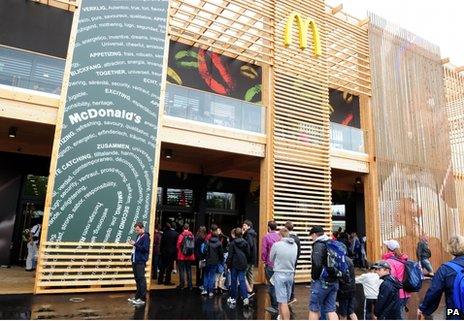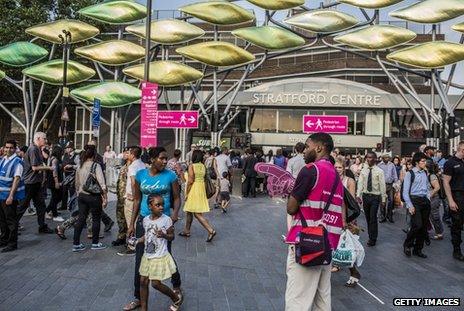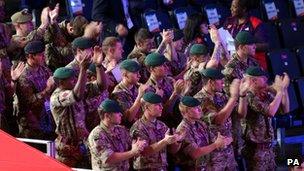Volunteers v corporates at the Olympics
- Published
- comments

If there were medals for hamburger joints, then one of the four (count them) McDonald's in the Olympic Park in London would take gold in the super-size division.
It is vast, a symbol of the global corporatism that feeds these Games - quite literally, in the case of the hundreds I joined in a queue for branded beef and buns.
The restaurant is currently the biggest McDonald's on the planet, equipped to serve tens of thousands of meals each day.
As I walked into the Park for the first time, I wondered whether the sponsors granted monopoly status beneath the sacred flame would overwhelm the fundamental principles of Olympism.
Would the spirit of London 2012 be epitomised by the fat oozing from tens of thousands of identical grilled patties or the ideals of "friendship, solidarity and fair play" which the International Olympic Committee proclaim?
To my pleasant surprise, it was the latter. At London 2012, the spirit of voluntarism is trumping commercialism.
Profits from the marketplace pay for the Games, of course. Global business and sport are as necessary to each other as rowers in a coxless pair. But in the short walk from Stratford station to the Olympic Park, it is the people who have given up their time for nothing who leave the greatest impression.
The giant billboards urging us to buy this kind of trainer or that brand of cola are the wallpaper. It is the cheery voices and smiles of volunteers that set the mood which infects the crowds. For me, it is the Games Makers who are making the Games.

In their purple and orange uniforms, the unpaid helpers are everywhere, ready with directions and brimming with enthusiasm. They have clearly been encouraged to let their personalities bloom. There is nothing corporate about the welcome. It is individual and human. It is really rather British.
Every one of the volunteers I met seemed sincere in simply wanting visitors to have a wonderful experience. There was little in it for them other than the joy of making London 2012 a success. (Unless you count a souvenir purple and orange uniform.)

Soldiers have been drafted in for security duties and to fill empty seats
McDonald's should take some credit for assembling this eager army. It is the burger giant that helped attract, select and train the 70,000 Games Makers who are key to delivering successful Olympic and Paralympic Games. These days, social responsibility is regarded as a vital ingredient in a quarter-pounder.
Global corporate success is dependent upon convincing customers and employees that you uphold the fundamental principles of Olympism. Multinationals know that reputation is critical to your bottom line.
That is why the biggest Mac in the world is festooned with banners proclaiming the company's commitment to sustainability. Come September, the Olympic Park restaurants will be dismantled - 75% of materials to be reused and the remainder, so they claim, recycled. Green is the colour.
The International Olympic Committee defines Olympism, external as "a way of life based on the joy of effort, the educational value of good example, social responsibility and respect for universal fundamental ethical principles".
This is the spirit in which the games must be played. And I suspect the organisers of London 2012 were acutely alert to the criticism that the demands of corporate branding might engulf such noble aims.
That, perhaps, explains why salespeople wander among the crowds with signs that simply say "BEER" or "WATER" rather than the trade-name of the product granted sole rights in the Olympic Park.
The mood is not so much one of "buy me" as "be me".
One cannot help but be impressed by the soldiers who search the bags, many with stories to tell of sacrifice for Queen and country; the athletes who have devoted years of their young lives to the pursuit of physical and mental excellence; and the Games Maker volunteers who take such pleasure in trying to ensure London's guests have a good time.
The symbol of the Games for me thus far is not a giant cheeseburger but a huge cheesy smile.